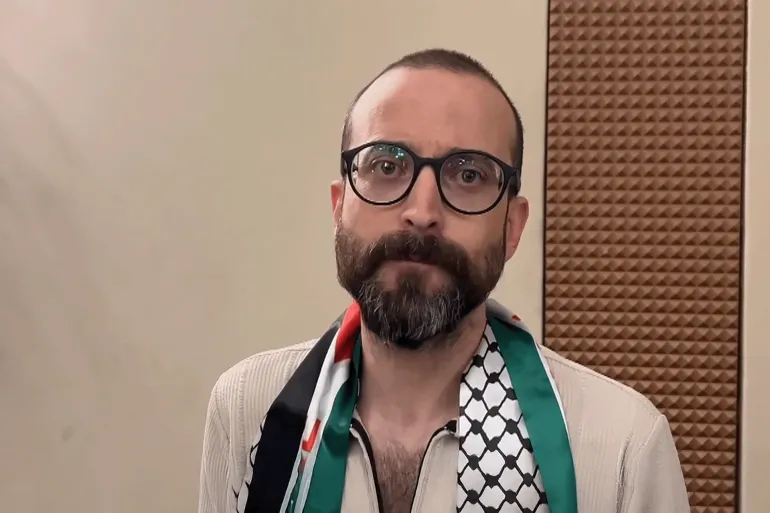
Award-winning Palestinian novelist Basim Khandakji has lived a story that reads like one of his own novels—marked by imprisonment, exile, and an unbroken spirit of resistance. From writing behind bars in Israeli prisons to winning the 2024 Arabic Booker Prize, his journey reflects both the personal cost of conflict and the power of art as a form of survival.
From Cell to Celebration: A Booker Prize Amid Punishment
When Basim Khandakji’s novel A Mask, The Colour of the Sky won the International Prize for Arabic Fiction (Arabic Booker) in 2024, celebration was short-lived. That same night, Israeli prison guards stormed his cell in Ofer Prison, beat him, bound his hands and feet, and threw him into solitary confinement for 12 days.
For the 42-year-old author, it was retaliation for what prison authorities saw as humiliation: a prisoner managing to write, publish, and win an international literary award from behind bars.
After 21 years in Israeli prisons, where he served three life sentences, Khandakji was finally freed this month as part of a prisoner exchange agreement. Yet freedom has come with exile—he was deported to Egypt and remains unable to return home to his family in Nablus.
“I still feel like I’m dreaming,” he says softly. “I’m terrified I’ll wake up back in a cell.”
Life and Horror Inside Israeli Prisons
Khandakji’s time behind bars was marked by what he calls “a cemetery of the living.” Convicted in 2004 for alleged involvement in a Tel Aviv bombing—charges he says he was coerced into confessing to—he spent years cycling through Israel’s 19 detention facilities.
“There are deliberate policies of starvation, abuse, psychological and physical torture, constant humiliation, and medical neglect,” Khandakji told Al Jazeera.
According to B’Tselem and the Palestinian Centre for Human Rights, systematic abuse in Israeli prisons has worsened since October 7, 2023—the date of the Hamas-led attack that killed more than 1,100 in Israel and triggered a devastating war on Gaza.
At least 75 Palestinian prisoners have died since then, and witnesses describe horrifying scenes. “Guards hung up the bodies of dead prisoners in cells,” Khandakji recalls. “Others saw a dozen corpses crammed into a single cell.”
He says starvation became a method of control: “They denied us food, blankets, heat—everything. Beatings targeted the head and spine. They wanted to destroy both body and soul.”
Writing as Resistance
In prison, writing became Khandakji’s lifeline. Denied regular access to pens and paper, he went on hunger strikes to obtain them. He hid manuscripts from guards and smuggled pages out through lawyers and visitors.
“Writing was my refuge,” he said. “Through it, I escaped prison walls and reclaimed my freedom in imagination.”
His acclaimed novel A Mask, The Colour of the Sky tells the story of Nur, a Palestinian archaeologist who assumes a stolen Israeli identity to move freely under occupation. The narrative explores identity, displacement, and the invisible barriers that separate Palestinians from their homeland.
The novel’s critical success—and its $50,000 prize—brought international attention to his plight. Yet it also drew fury from Israeli far-right politicians. National Security Minister Itamar Ben-Gvir demanded harsher punishment for Khandakji, while extremist voices called for his death.
When Israel’s war on Gaza began, conditions in prison deteriorated further. Guards confiscated his glasses and writing materials. “Being deprived of my pen felt like being deprived of air,” he says.
Friendship, Loss, and Memory
Khandakji’s years in captivity were marked not only by suffering but by deep human connections. Among his cellmates was Marwan Barghouthi, the Fatah leader often likened to Nelson Mandela for his long imprisonment and influence among Palestinians.
“Marwan is a great man,” Khandakji says. “If he were released, he could unite the Palestinian people.”
Barghouthi, now 66, was reportedly beaten unconscious by prison guards in September 2025. His son has warned that his life remains in danger.
Khandakji also lost close friends, including fellow writer Walid Daqqa, who died of cancer in custody after alleged medical neglect. His next novel—written entirely in his mind during his final year in prison—will be a tribute to Daqqa’s life.
Exile After Freedom
Though free, Khandakji’s exile weighs heavily. When the prison bus took him south toward Egypt instead of north to Nablus, he realized that his “freedom” would be partial.
“Being exiled from your homeland is a burning wound,” he says. “Palestinians do not live in their homeland—their homeland lives within them.”
He continues to write from exile and plans to pursue a PhD after completing a master’s degree in Israeli studies while incarcerated. His family, still in the West Bank, is fighting to join him in Egypt.
“I still hope I’ll be allowed to embrace my mother,” he says quietly. “Not as a freed prisoner—but as a child searching for the scent of his childhood.”
A Voice for the Voiceless
Basim Khandakji’s story is not only one of endurance but of transformation—the journey of a man who turned captivity into creativity, despair into literature, and silence into testimony.
His voice now echoes far beyond the prison walls where it was once confined, illuminating the struggles of thousands of Palestinians still imprisoned, and the enduring human spirit that refuses to be silenced.


Leave a Reply